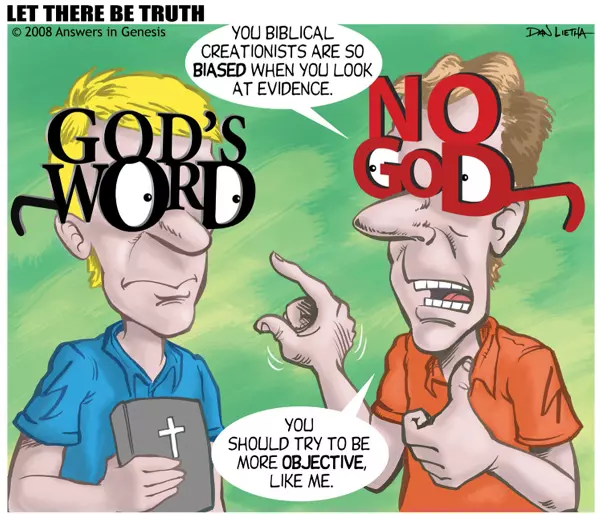A recent ongoing conversation with someone who isn’t already a biblical creationist has gotten me thinking about how carefully we need to handle ourselves in such interactions. You are sure to have noticed how easily people in politics can get lazy with their assumptions and how common it is for them to misrepresent the position and reasoning of those they oppose.
Creationists are not exempt from this human tendency.
In fact, today I resonated with a set of guidelines a friend of mine who is studying chemistry at a secular school shared that all scientists (and others) are wise to heed when building a case for their position. Thus, the mild crudeness of their acronym:
The CRAAP Test
Wikipedia tells me these criteria were developed by Sarah Blakeslee to help her fellow librarians best assure their source materials are credible.
Here is the original list from the Meriam Library of CSU, Chico:
Currency: The timeliness of the information
- When was the information published or posted?
- Has the information been revised or updated?
- Is the information current or out-of date for your topic?
- Are the links functional? *
Relevance: The importance of the information for your needs
- Does the information relate to your topic or answer your question?
- Who is the intended audience?
- Is the information at an appropriate level (i.e. not too elementary or advanced for your needs)?
- Have you looked at a variety of sources before determining this is one you will use?
- Would you be comfortable using this source for a research paper?
Authority: The source of the information
- Who is the author/publisher/source/sponsor?
- Are the author’s credentials or organizational affiliations given?
- What are the author’s credentials or organizational affiliations given?
- What are the author’s qualifications to write on the topic?
- Is there contact information, such as a publisher or e-mail address?
- Does the URL reveal anything about the author or source? examples: .com .edu .gov .org .net *
Accuracy: The reliability, truthfulness, and correctness of the informational content
- Where does the information come from?
- Is the information supported by evidence?
- Has the information been reviewed or refereed?
- Can you verify any of the information in another source or from personal knowledge?
- Does the language or tone seem biased and free of emotion?
- Are there spelling, grammar, or other typographical errors?
Purpose: The reason the information exists
- What is the purpose of the information? to inform? teach? sell? entertain? persuade?
- Do the authors/sponsors make their intentions or purpose clear?
- Is the information fact? opinion? propaganda?
- Does the point of view appear objective and impartial?
- Are there political, ideological, cultural, religious, institutional, or personal biases?
Key: * indicates criteria is for Web sources only
How this connects to Biblical Creation
Bias
Obviously we are comfortable with religious bias in the material we source. We have staked our eternal souls on the reality that Jesus Christ is the real Creator as well as our Savior and Lord and he gave us his eye-witness account of earth’s past. But even something like this is an issue to be aware of when interacting with those outside the fold.
You are probably aware of how often Answers in Genesis and others point to the inherent bias all scientists have. Acknowledging that the other side prides themselves in being ‘unbiased’ and shining the light on their necessary bias is an important part of our apologetic toolbox.
This resistance to ‘bias’ can be something we accommodate without too much difficulty since the earth is the Lord’s and all scientific facts point to him. All the major creation organisations use secular journals as source material and jumping this hurdle is one of many reasons to do so.
Free From Emotion
No, I don’t think it is good for us to become stoics; Jesus displays the full range of emotions. But, there is a good reason for us to second guess our choice of words when dealing with such a hot button topic as origins. It is a sad reality that we can slip into being as snarky and condescending as our opponents. They are just mimicking their father. Are we?
In Jesus’ first specific topic on the Sermon on the Mount he gives this warning:
But I say unto you, That whosoever is angry with his brother without a cause shall be in danger of the judgment: and whosoever shall say to his brother, Raca [Empty Head], shall be in danger of the council: but whosoever shall say, Thou fool, shall be in danger of hell fire. Matthew 5:22
Sadly, I’ve had to disassociate myself from an amateur apologist for refusing to heed this guidance. May our every word radiate God’s love and respect for each individual reader!
Timeliness
I so appreciate how Creation Ministries International handles this issue:
Editor’s note: As Creation magazine has been continuously published since 1978, we are publishing some of the articles from the archives for historical interest, such as this. For teaching and sharing purposes, readers are advised to supplement these historic articles with more up-to-date ones available by searching creation.com.
Powerful as ICR’s materials were for the growth of the modern creationist movement, not everything they first held to has stood the test of time scientifically. Their ministry wisely has held strong to the Bible while recognizing not every interpretation and scientific hypothesis allowed by Scripture is automatically true. For instance ICR no longer holds to the Canopy Theory although they were champions of this view for decades.
Both Creation Ministries International and Answers in Genesis have full pages with more links to help creationists know what arguments we would be wise to avoid since they can’t be supported scientifically. One of my first research projects when entering the creation apologetics field was to familiarize myself with these no-nos so I wouldn’t accidentally undermine my credibility by making unsupported claims.
The Bible is, of course, unchanging and many things in science remain constant. But how we interpret various details, and models we build on what God is trying to say, must always be held in an open hand.
Siting Sources
Odd as this may seem, I have discovered there is a certain section of creation apologists who don’t understand the absolute necessity of referencing primary sources. A few times in my role as editor and gatekeeper for the Creation Club I’ve had to postpone an article because the article’s claims had no support.
Even if we are the scientist doing on the ground research, we have a responsibility for showing why anyone should take our word for it.
How can we expect someone to not only trust us, but pass our conclusions on to others if all they have to point to is our article?
Pay attention the next time you visit one of the major creation websites. You would be hard pressed to find a single article without a list of footnotes of original sources they used in building their case.
Behold, I send you forth as sheep in the midst of wolves: be ye therefore wise as serpents, and harmless as doves. Matthew 10:16
But sanctify the Lord God in your hearts: and be ready always to give an answer to every man that asketh you a reason of the hope that is in you with meekness and fear: 1 Peter 3:15







